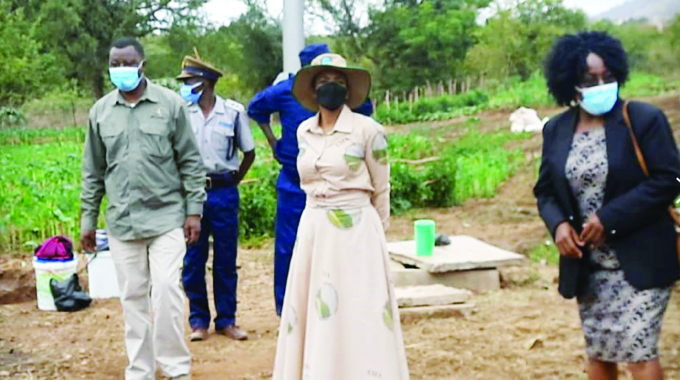Sowing seeds of sustainability: Turning open pits into community gardens

Victor Maphosa Mash East Bureau
Widespread uncontrolled gold panning has had a devastating impact on the environment and the community in the dry and arid Makaha area of Mudzi district in the eastern part of the country.
Trails of open pits and heaps of soil are a common feature on most gold panning sites dotted around the area.
Gold panning is a livelihood activity for many here and along rivers and other areas, people can be seen clutching shovels, picks and buckets all in search of the precious yellow mineral that is gold.
The results are scary. Land, rivers and surrounding areas are left scarred and ravaged.
Vegetation destruction is rampant as well as the pollution of fragile river ecosystems. Litter is strewn all over.
The legacy of gold panning activities has typically led to the degradation of land leaving vast tracts of land unsuitable for any alternate use.
Huge and deep pits left open in most villages in Makaha pose great danger to both humans and animals.
Artisanal miners hardly care about restoring the land which they pan for gold. The hop from one area to the other in search of the precious metal leaving a trail of land and environmental degradation.
The results of the uncontrolled mining activities are profound. Rivers are heavily polluted with mercury and cyanide discharged into them by the illegal gold miners.
Water pollution by chemicals affects humans and aquatic life in most cases leading to the poisoning of fish and other species.
Negative impacts are intensely felt by people living downstream.
“When gold panners dig along the riverbeds, they disturb soil stability and cause the river banks to collapse resulting in siltation of the river and catchment dams thereby reducing water quantity. They leave open pits and these have claimed the lives of people and our livestock,” said Washington Makina of Ward 14 in Mudzi.
“Gold panning has reduced the available land for cultivation and gardening.”
But things are now changing.
Makina and his community are being supported by the United Nations Development Programme (UNDP) to restore degraded land and open new livelihood opportunities.
The support comes under the Preparatory Support to the Sustainability of the Extractives Sector in Zimbabwe which aims to help locals to reduce the use of mercury in mining as well provide alternative livelihoods to them.
The Makaha community hosted the 2022 World Desertification and Drought Day commemorations to showcase various projects aimed at land restoration.
Villagers are now transforming degraded lands into community gardens as part of efforts to halt desertification and to adapt to climate change related problems.
Makaha villagers are now refilling those huge pits which were left open by artisanal miners and turning them into community gardens, where they grow vegetables for sale in the same community, as well as the artisanal miners.
UNDP installed solar powered systems to support the gardens with irrigation water.
Most women are happy with the project that has enhanced food and water security in this dry and arid region.
“The idea of doing gardens came in 2019 but we did not have any place. One of the villagers gave us a field which had huge pits and we had to look for excavators to fill them. In 2020, we got assistance from UNDP to drill a borehole. They installed a solar water pump system which helped people from three villages to access water,” Makina said.
“We engaged Agritex officers in the planning and establishment of our community garden. Now we have green vegetables every time and we supply a lot of people. We are now preserving the environment and at the same time earning a living.”
Makina recalls that artisanal mining is unsafe and damages the environment.
“Some of us have been artisanal miners, it is hard and unsafe going inside these pits,” he said.
“We have been working hard but with these gardens, yes we work hard, but we are guaranteed an income. We have a market here and we are expecting to do more gardens or expand this one so that we can supply all the people in Makaha.”
Turning the ugly mine pits into community gardens has brought hope to women who endure rough treatment from male gold panners.
“We are so happy about the project. It has given us hope as women. We now have water and vegetables. Our area is very dry and having water means a lot for us women,” said Veronica Kativhu of Mudzi.
“Community gardens empower us to produce food on our own. We now get clean water closer to our homes. This is a very good project.”
Land restoration has the potential to create positive economic and environmental conditions for local inhabitants.
Worldwide, it is estimated that there are more than 43 million micro, small, medium and large artisanal miners extracting at least 30 different minerals in rural regions of developing countries.
Approximately 20 million people in more than 70 countries are directly involved in artisanal gold mining, with an estimated gold production between 380 and 450 tonnes per annum.
Human activities combined with natural disasters, such as drought, contribute to land degradation globally, as people make efforts to survive using naturally available resources.
Years of over-farming, overgrazing, coupled with climate change are increasing the threat of desertification in Zimbabwe, something that could also threaten the livelihoods of thousands of people and the survival of wildlife.
Land restoration initiatives remain critical in promoting sustainable land management in line with the decade of ecosystem restoration 2020 – 2030 as well as the NDS1 goals.
Zimbabwe now needs to scale-up and share best practices on innovative drought and water security projects that have been implemented successfully in both rural and urban areas.
There are several case studies of interventions in drought and water security that the country must consolidate, share lessons and replicate the good practices in areas that still lack the requisite programmes.
The urban and rural poor still face the daily challenge of food, energy and water insecurity.
The continent has one billion hectares of drylands, 393 million hectares of which need restoration in Africa’s Great Green Wall areas, according to the UN Food and Agriculture Organisation (FAO).
Africa has an estimated additional 132 million hectares of degraded cropland, which combined with climate change, makes millions more vulnerable.
Around 45 percent of Africa’s land is impacted by desertification, 55 per cent of which is at very high risk of further desertification.
These statistics are alarming and call for the prioritization of sustainable land management projects and programmes that offer long term solutions to drought management as well as climate change adaptation measures to support community livelihoods.
Issues of land degradation, drought and their impacts know no boundaries and it should therefore be part of a solution seeking mechanism for the good of our communities and our country.
These are challenges of a global dimension that not only contribute to but also aggravate economic, social and environmental problems such as poverty, poor health, food scarcity, biodiversity loss, water scarcity, reduced resilience to climate change and other shocks and in some instances, forced migration.
“My ministry is also fully aware that small scale mining continues to significantly contribute towards Zimbabwe’s economic growth providing a direct livelihood to an estimated 500 000 people,” said Deputy Minister of Environment, Climate, Tourism and Hospitality Industry Barbara Rwodzi.
“I, therefore, call upon the sector to carry out its mining activities in a sustainable manner in order to protect the environment. I urge all miners to rehabilitate decommissioned mining sites and restore the land for other productive uses.”
Zimbabwe developed Land Degradation Neutrality (LDN) Targets in 2017 to ensure the improvement of land cover, land productivity and soil organic.
Additionally, the National Development Strategy 1 (NDS 1), places land restoration among the national priorities.










Comments